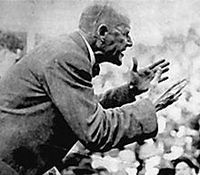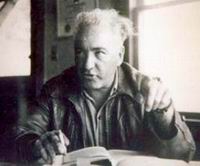Seeds of Fire: A People’s Chronology
Recalling events that happened on this day in history.
Memories of struggle, resistance and persistence.
Compiled by Ulli Diemer
|
June 26, 1848
|
|
|
The uprising of the Paris workers which began on June 23 is finally defeated by the massed armed forces of the French state. So heroic and determined was the resistance of the poorly armed workers that the French government was forced to bring military from across the entire country to Paris to defeat them. In the end, a force of 125,000 soldiers is needed to put down the uprising, which ends in a mass slaughter of prisoners.
|
|
June 26, 1869
|
|
Birth of Martin Andersen Nexo (1869-1954), Danish author and socialist.
Nexo is the first major Danish writer to depict the working class in his writings. Nexo starts out as an industrial worker, attends a folk school, and then works as a journalist. He becomes a member of the Social Democratic movement, and then, after the collapse of the Second International in the face of war, joins the Communist Party.
Pelle Erobreren (Pelle the Conqueror), his best-known work, is the basis of two films.
|
|
June 26, 1918
|

|
|
Socialist Eugene Debs is arrested for having given an anti-war speech in Canton, Ohio, ten days earlier. He is charged with “uttering words intended to cause insubordination and disloyalty within the American forces of the United States, to incite resistance to the war, and to promote the cause of Germany.”
Debs had said: “And that is war in a nutshell. The master class has always declared the wars; the subject class has always fought the battles. The master class has had all to gain and nothing to lose, while the subject class has had nothing to gain and all to lose – especially their lives.”
|
|
June 26, 1919
|
|
|
End of the Winnipeg General Strike.
|
|
June 26, 1955
|
|
|
The South African Freedom Charter is adopted at the Congress of the People at Kliptown near Johannesburg. Declaring its opposition to apartheid, it states: “We, the People of South Africa, declare for all our country and the world to know that South Africa belongs to all who live in it, black and white, and that no government can justly claim authority unless it is based on the will of all the people.”
|
|
June 26, 1956
|

|
Federal agents raid Wilhelm Reich’s home and set about destroying what they call ‘promotional materials’ for his controversial theories about orgone energy, including his books. On August 23 they complete the job, burning six tons of his books, journals, and papers in a public incinerator. The burned materials include copies of his books The Sexual Revolution, Character Analysis, and The Mass Psychology of Fascism.
A few months later, on March 12, 1957, Reich is imprisoned for violating the terms of an injunction against the interstate shipment of his ‘orgone accumulator’ devices and associated literature. He dies in prison in November 1957.
|

